2018年福师大《大学英语(1)期末考试卷A0
- 格式:doc
- 大小:66.50 KB
- 文档页数:3
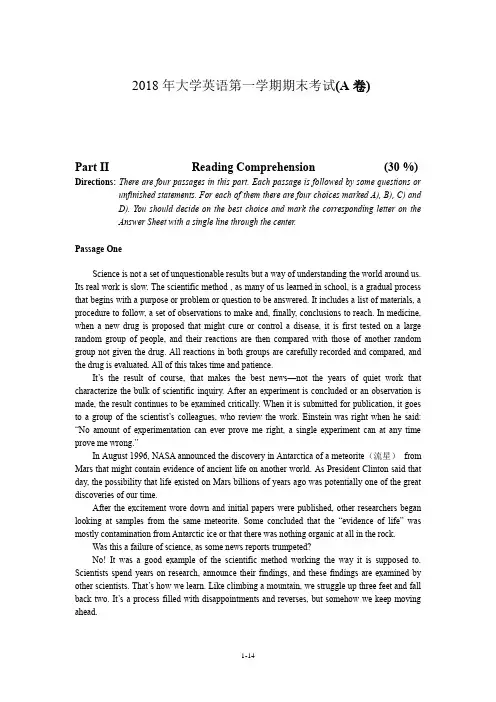
2018年大学英语第一学期期末考试(A卷)Part II Reading Comprehension (30 %) Directions: There are four passages in this part. Each passage is followed by some questions or unfinished statements. For each of them there are four choices marked A), B), C) andD). You should decide on the best choice and mark the corresponding letter on theAnswer Sheet with a single line through the center.Passage OneScience is not a set of unquestionable results but a way of understanding the world around us. Its real work is slow. The scientific method , as many of us learned in school, is a gradual process that begins with a purpose or problem or question to be answered. It includes a list of materials, a procedure to follow, a set of observations to make and, finally, conclusions to reach. In medicine, when a new drug is proposed that might cure or control a disease, it is first tested on a large random group of people, and their reactions are then compared with those of another random group not given the drug. All reactions in both groups are carefully recorded and compared, and the drug is evaluated. All of this takes time and patience.It’s the result of course, that makes the best news—not the years of quiet work that characterize the bulk of scientific inquiry. After an experiment is concluded or an observation is made, the result continues to be examined critically. When it is submitted for publication, it goes to a group of the scientist’s colleagues, who review the work. Einstein was right when he said: “No amount of experimentation can ever prove me right, a single experiment can at any time prove me wrong.”In August 1996, NASA announced the discovery in Antarctica of a meteorite(流星)from Mars that might contain evidence of ancient life on another world. As President Clinton said that day, the possibility that life existed on Mars billions of years ago was potentially one of the great discoveries of our time.After the excitement wore down and initial papers were published, other researchers began looking at samples from the same meteorite. Some concluded that the “evidence of life”was mostly contamination from Antarctic ice or that there was nothing organic at all in the rock.Was this a failure of science, as some news reports trumpeted?No! It was a good example of the scientific method working the way it is supposed to. Scientists spend years on research, announce their findings, and these findings are examined by other scientists. That’s how we learn. Like climbing a mountain, we struggle up three feet and fall back two. It’s a process filled with disappointments and reverses, but somehow we keep moving ahead.21. The author’s main purpose in writing this passage is to state that ____________.A) most scientific discoveries are not reliableB) mass media is misleading because it looks at the research results onlyC) scientific research is a process filled with reverses and requires slow and patientworkD) repeated experiments are necessary before medicine can be used in patients22. Publication of a scientific finding signifies __________.A) a challenge to fellow scientists to prove it wrongB) the end of a processC) the beginning of a new scientific inquiryD) the soundness of the result23. Einstein’s words are used to show that he thought___________.A) experiments have proved him rightB) scientists do not need so many experimentsC) one experiment is not enough to prove him wrong.D) scientific ideas are never free from challenge24. NASA’s announcement of the discovery of evidence of ancient life on Mars shows _________.A) the way human beings learn about natureB) the failure of the scientific methodC) the fruitlessness of human search for life on another worldD) the excitement brought by scientific findings25. It can be inferred from the passage that the media is interested in __________.A) the process of scientific researchB) the results of scientific researchC) the scientists who do the researchD) the effects of scientific research on human lifePassage TwoNormally a student must attend a certain number of courses in order to graduate, and each course which he attends gives him a credit which he may count towards a degree. In many American universities the total work for a degree consists of thirty-six courses each lasting for one semester. A typical course consists of three classes per week for fifteen weeks; while attending a university a student will probably attend four or five courses during each semester. Normally a student would expect to take four years attending two semesters each year. It is possible to spread the period of work for the degree over a longer period. It is also possible for a student to move between one university and another during his degree course, though this is not in fact done as a regular practice.For every course that he follows a student is given a grade, which is recorded, and the recordis available for the student to show to prospective employers. All this imposes a constant pressure and strain of work, but in spite of this some students still find time for great activity in student affairs. Elections to positions in student organizations arouse much enthusiasm. The effective work of maintaining discipline is usually performed by students who advise the academic authorities. Any student who is thought to have broken the rules, for example, by cheating has to appear before a student court. With the enormous numbers of students, the operation of the system does involve a certain amount of activity. A student who has held one of these positions of authority is much respected and it will be of benefit to him later in his career.26. Normally a student would at least attend __________classes each week.A) 36B) 12C) 20D) 1527. According to the first paragraph an American student is allowed _______.A) to live in a different universityB) to take a particular course in a different universityC) to live at home and drive to classesD) to get two degrees from two different universities28. American university students are usually under pressure of work because_________.A) their academic performance will affect their future careersB) they are heavily involved in student affairsC) they have to observe university disciplineD) they want to run for positions of authority29.Some students are enthusiastic for positions in student organizations probablybecause_________.A) they hate the constant pressure and strain of their studyB) they will then be able to stay longer in the universityC) such positions help them get better jobsD) such positions are usually well paid30. The student organizations seem to be effective in _________.A) dealing with the academic affairs of the universityB) ensuring that the students observe university regulationsC) evaluating students’ performance by bringi ng them before a courtD) keeping up the students’ enthusiasm for social activitiesPassage ThreeDoreen Sykora is now a junior at Mcgill University. She had a difficult time when she first began college. She said, “I was always well prepared for my examinations. But I would go in to class to take the exam, and I would fall apart. I could not answer the questions correctly-----eventhough I knew the answers! I would just blank out because of nervousness and fear.”Hitoshi Sakamoto, an anthropology student at Temple University in Tokyo reports similar experiences.These two young students were experiencing something called test anxiety. Because a student worries and is stressed about a test, his or her mind does not work as well as it usually does. The student cannot write or think clearly because of the severe tension and nervousness.Now there are special university courses to help students. In these courses, advisors and psychologists try to help students by teaching them to manage test anxiety. Such a course helps students learn to live with stress and not fail because of it. First students take a practice test to measure their worry level. If the tests show that their stress level is high, the students can take a short course to manage the fear. These courses teach students how to relax their bodies. They get training to become calm in very tense situations. By controlling their nervousness, they can let their minds work more easily. Learned information then comes out without difficulty on a test.Doreen Sykora saw immediate results after taking such a course. She now has enthusiasm about the relaxation methods. “Mostly, what I do is imagine myself in a very calm place. Then I imagine myself picking up a pencil. I move slowly and carefully. I breathe easily and let all the tension out. With each breath, more worry leaves me. It really works too. My grades have improved greatly! I’m really doing well at McGill now. This relaxation method works not only on examinations, but it has improved the rest of my life as well.”For Hitoshi in Tokyo, the results were much the same. He is enjoying school a lot more and learning more.31. Doreen Sykora and Hitoshi Sakamoto were filled with nervousness and fear duringexaminations because they were__________.A) not ready and unaware of the answersB) physically so weak that they fell apartC) subject to test anxietyD) unable to write or think clearly32. The higher the students’ worry level is, __________.A) the less calm and relaxing they areB) the more difficult they will be trained to manage fearC) the more stressed and tense they areD) the longer courses they will take to manage fear33. What’s the purpose of some special university student-help courses?A) To help students to reduce test anxiety.B) To show a stress level experienced by students.C) To learn more knowledge about test anxiety.D) To have a better understanding of test anxiety.34. What’s the meaning of “blank out” in paragraph one?A) To be like a blanket.B) To be sure of an answer.C) To be relaxed.D) To be unable to think clearly.35.Which of the following best sums up the organization of the passage?A) Examples----theories----ideas.B) Problem----strategy----examples----results.C) General statement----examples----result.D) Strategy----experiment----examples.Part III Vocabulary and Structure (15 %) Directions: There are 30 incomplete sentences in this part. For each sentence there are four choices marked A), B), C) and D). Choose the ONE that best completes the sentence.Then mark the corresponding letter on the Answer Sheet with a single line throughthe center.36. The president made a _______ speech at the opening ceremony of the sports meeting, whichencouraged the sportsmen greatly.A)vigorousB)tedious C)flatD)harsh37. It is not easy to learn English well but if you _______, you will succeed in the end.A)hang upB)hang about C)hang onD)hang onto38. Remember that customers don’t _______ about prices in that city.A)debateB)bargain C)disputeD)consult39. The newcomers found it impossible to _______ themselves to the climate sufficiently to makepermanent homes in the new country.A)suitB)adapt C)regulateD)coordinate40. A _______ to this problem is expected to be found before long.A)resultB)function C)settlementD)solution41. You have nothing to _______ by refusing to listen to our advice.A)gainB)grasp C)seizeD)earn42. One day I _______ a newspaper article about the retirement of an English professor at anearby state college.A)came acrossB)came about C)came afterD)came at43. A peculiarly pointed chin is his memorable facial _______.A)markB)feature C)traceD)appearance44. I hope that you’ll be more careful in typing the letter. Don’t _______ anything.A)omitB)leak C)lackD)withdraw45. Our new house is very _______ for me as I can get to the office in five minutes.A)adaptableB)convenient C)availableD)comfortable46. Those gifts of rare books that were given to us were deeply _______.A)appreciatedB)approved C)appealedD)applied47. The sale usually takes place outside the house, with the audience _______ on benches, chairsor boxes.A)having seatedB)seating C)seatedD)having been seated48. He is _______ about his chances of winning a gold medal in the Olympics next year.A)optimisticB)optional C)outstandingD)obvious49. The clothes a person wears may express his _______or social position.A)curiosityB)status C)determinationD)significance50. I don’t know the word. I had to _______ a dictionary.A)throw upB)make out C)refer toD)take over51. Look at these beautiful Japanese stamps. Roger gave them to me in _____ for two sets of 1988British special issue.A)exchangeB)change C)shiftD)switch52. It is rather _____ that the research team as a whole still has little idea about the cause of thatfatal disease.A)rewardingB)demanding C)embarrassingD)requiring53. The people of African interior began to _____ gold in exchange for the goods they neededfrom abroad.A)desireB)afford C)offerD)receive54. We should not blame her for what happened yesterday, because that was outside her _____ofresponsibility.A)fieldB)limit C)extentD)range55. The students put forward some suggestions _____ consideration.A)worthlessB)worthy C)worthD)worthy of56. The author of the report is well _____ with the problem in the hospital because he has beenworking there for many years.A)acquaintedB)informed C)enlightenedD)advised57. After years of hard work, he finally gained ______ to the university which he longed for manyyears.A)accessB)commitment C)opportunityD)reward58. _____ you have passed the driving test successfully, you can drive on your own.A)By nowB)Now and again C)Now thenD)Now that59. Within first seven seconds of meeting, people will form their opinion about others throughunspoken communication like _____, postures and attitudes.A)signsB)gestures C)symptomsD)symbols60. It had never _____ to me that our football team won the game.A)struckB)occurred C)hitD)meant61. The students ______ in cleaning the classroom according to the arrangement.A)alternateB)adapt C)adoptD)admit62. Have you any ______plans about how to deal with these difficulties? We need to bepractical-minded.A)abstractB)consistent C)concreteD)contrary63. The professor was afraid that unless the train speeded up he would miss his _______ to NewYork.A)junctionB)connection C)seatD)carriage64. When writing about controversial topics, some authors try to be _______ without favoringeither side.A)reflectiveB)persuasive C)impressiveD)objective65. Many factors such as too much stress, bad living habits can lead to poor ______ and ill health.A)experienceB)appearance C)performanceD)competencePart IV Cloze (10 %)Directions: There are 20 blanks in the following passage. For each blank there are four choices marked A), B), C) and D). You should choose the ONE answer that best fits into thepassage. Then mark the corresponding letter on the Answer Sheet with a single linethrough the center.Language is a signaling system which operates withsymbolic vocal sounds (语声), and which is used by agroup of people for the purpose of communication.Let’s look at this 66______ in more detail, because it is language, more than anything else, 67_____ distinguishes man from the rest of the 68_____ world.Other animals, it is true, communicate with one another by 69_____ of cries: for example, many birds utter (发声) 70_____calls at the approach of danger; monkeys utter 71_____ cries, such as expressions of anger, fear and pleasure. 72_____ these various means of communication differ in important ways 73_____ human language. For instance, animals’cries do not 74_____ 66. A) recognitionB) function67. A) itB) that68. A) nativeB) animal69. A) waysB) methods70. A) datingB) exciting71. A) identicalB) different72. A) ButB) Therefore73. A) fromB) about74. A) inferB) explainC) classificationD) definitionC) asD) whatC) humanD) physicalC) meansD) approachesC) warningD) boringC) similarD) unfamiliarC) AfterwardsD) FurthermoreC) withD) inC) interpretD) expressthought and feelings clearly. This means, basically, that they lack structure. They lack the kind of structure that75_____ us to divide a human utterance (发声) into 76_____.We can change an utterance by 77_____ one word in it with 78_____: a good illustration of this is a soldier who can say, e.g., “tanks approaching from the north”, 79_____ who can change one word and say “aircraft approaching from the north” or “tanks approaching from the west”; but a bird has a single alarm cry, 80_____ means “danger!”This is why the number of 81_____ that an animal can make is very limited: the great tit (山雀) is a case 82_____ point; it has about twenty different calls, 83_____ in human language the number of possible utterances is 84_____. It also explains why animal cries are very 85_____ in meaning. 75. A) encouragesB) enforces76. A) soundsB) words77. A) spellingB) saying78. A) oursB) another79. A) soB) but80. A) thisB) that81. A) signsB) signals82. A) inB) at83. A) sinceB) while84. A) limitlessB) boundless85. A) ordinaryB) alikeC) enablesD) ensuresC) voicesD) speechesC) replacingD) pronouncingC) theirsD) othersC) orD) andC) whichD) itC) gesturesD) marksC) ofD) forC) anyhowD) somehowC) changeableD) ceaselessC) commonD) generalPart V Writing (15%) Directions: For this part, you are allowed 30 minutes to write a composition on the topic My View on Online Self-access Learning. You should write at least 120 words. And youshould base your composition on the outline (given in Chinese) below:1.一些人认为上机自主学习方式好;2.也有一些人认为传统的授课方式好;3.我的看法。
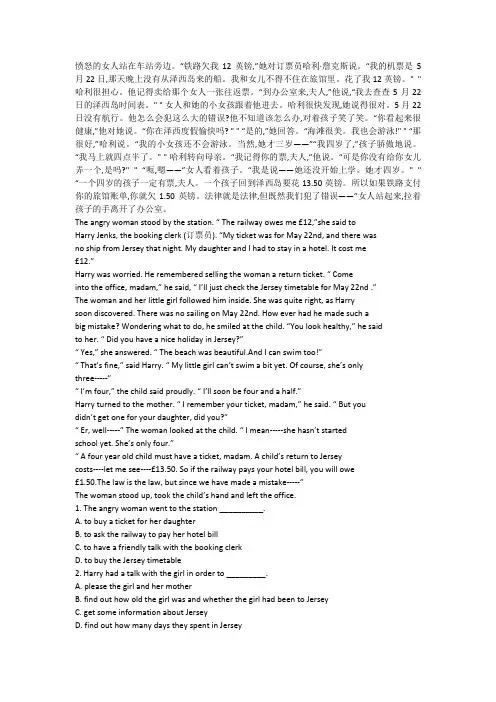
愤怒的女人站在车站旁边。
“铁路欠我12英镑,”她对订票员哈利·詹克斯说。
“我的机票是5月22日,那天晚上没有从泽西岛来的船。
我和女儿不得不住在旅馆里。
花了我12英镑。
" " 哈利很担心。
他记得卖给那个女人一张往返票。
“到办公室来,夫人,”他说,“我去查查5月22日的泽西岛时间表。
" " 女人和她的小女孩跟着他进去。
哈利很快发现,她说得很对。
5月22日没有航行。
他怎么会犯这么大的错误?他不知道该怎么办,对着孩子笑了笑。
“你看起来很健康,”他对她说。
“你在泽西度假愉快吗? " " “是的,”她回答。
“海滩很美。
我也会游泳!" " “那很好,”哈利说。
“我的小女孩还不会游泳。
当然,她才三岁——”“我四岁了,”孩子骄傲地说。
“我马上就四点半了。
" " 哈利转向母亲。
“我记得你的票,夫人,”他说。
“可是你没有给你女儿弄一个,是吗?" " “呃,嗯——”女人看着孩子。
“我是说——她还没开始上学。
她才四岁。
" " “一个四岁的孩子一定有票,夫人。
一个孩子回到泽西岛要花13.50英镑。
所以如果铁路支付你的旅馆账单,你就欠1.50英镑。
法律就是法律,但既然我们犯了错误——”女人站起来,拉着孩子的手离开了办公室。
The angry woman stood by the station. “ The railway owes me £12,”she said toHarry Jenks, the booking clerk (订票员). “My ticket was for May 22nd, and there wasno ship from Jersey that night. My daughter and I had to stay in a hotel. It cost me£12.”Harry was worried. He remembered selling the woman a return ticket. “ Comeinto the office, madam,” he said, “ I’ll just check the Jersey timetable for May 22nd .”The woman and her little girl followed him inside. She was quite right, as Harrysoon discovered. There was no sailing on May 22nd. How ever had he made such abig mistake? Wondering what to do, he smiled at the child. “You look healthy,” he saidto her. “ Did you have a nice holiday in Jersey?”“ Yes,” she answered. “ The beach was beautiful.And I can swim too!”“ That’s fine,” said Harry. “ My little girl can’t swim a bit yet. Of course, she’s onlythree-----”“ I’m four,” the child said proudly. “ I’ll soon be four and a half.”Harry turned to the mother. “ I remember your ticket, madam,” he said. “ But youdidn’t get one for your daughter, did you?”“ Er, well-----” The woman looked at the child. “ I mean-----she hasn’t startedschool yet. She’s only four.”“ A four year old child must have a ticket, madam. A child’s return to Jerseycosts----let me see----£13.50. So if the railway pays your hotel bill, you will owe£1.50.The law is the law, but since we have made a mistake-----”The woman stood up, took the child’s hand and left the office.1. The angry woman went to the station __________.A. to buy a ticket for her daughterB. to ask the railway to pay her hotel billC. to have a friendly talk with the booking clerkD. to buy the Jersey timetable2. Harry had a talk with the girl in order to _________.A. please the girl and her motherB. find out how old the girl was and whether the girl had been to JerseyC. get some information about JerseyD. find out how many days they spent in Jersey3. The hotel bill is __________.A. more than the cost of a child’s ticketB. exactly the same as the cost of a child’s ticketC. less than the cost a child’s ticketD. more than the cost of a woman’s ticket4. The child is ___________ years old.A. twoB. fourC. threeD. five5. A girl of _________ should buy a ticket according to the law of the railway.A. threeB. fourC. fiveD. sixB BCD D二.语法与词汇:(请认真复习好第一册课本Unit 4课后Pick up Your Grammar 中的“动词的语态”后再完成如下5道选择题)6. We all believe that computer ___________ smaller and smaller in the coming years.A. can be becomeB. will be gotC. will be changedD. can turn7. He _______________ not to leave waste paper in public places any more.A. warnsB. warnedC. is warnedD. was warned8. That factory _________ nearly 50 years ago.A. has been builtB. had builtC. was builtD. has built9. Such problems ______________ as soon as possible.A. have solvedB. have been solvingC. have to solveD. have to be solved10. Because of the rainy day, the match __________.A. has been putting offB. has put offC. put offD. has been put offD C C D D1. The angry woman went to the station __________.A. to buy a ticket for her daughterB. to ask the railway to pay her hotel billC. to have a friendly talk with the booking clerkD. to buy the Jersey timetable2. Harry had a talk with the girl in order to _________.A. please the girl and her motherB. find out how old the girl was and whether the girl had been to JerseyC. get some information about JerseyD. find out how many days they spent in Jersey3. The hotel bill is __________.A. more than the cost of a child’s ticketB. exactly the s ame as the cost of a child’s ticketC. less than the cost a child’s ticketD. more than the cost of a woman’s ticket4. The child is ___________ years old.A. twoB. fourC. threeD. five5. A girl of _________ should buy a ticket according to the law of the railway.A. threeB. fourC. fiveD. sixBBCBBIf you don’t, you could end ____ spending hundreds of dollars more than you should have.12. As activities are usually carried _____ during one’s spare time, leisurehas the following functions: relaxation, recreation and entertainment, and personal development.13. You should start packing ____least a week in advance.14. Because you don’t want to stay _____ all night packing and wear yourselfout before you even leave for the trip.15. Moreover, you should also find ____ the best time of year to go.By out at up out26.(30.0分)四.英译汉:30%Drinking habits vary widely among Americans.Some families never serve any drinks, others have them before dinner,or perhaps after dinner.You are more likely to be offered a cocktail before dinner than wine with the meal.If you do not get used to American cocktails, you can ask for s omething else.Moreover, drinks may be poured over ice.美国人的饮酒习惯差别很大。
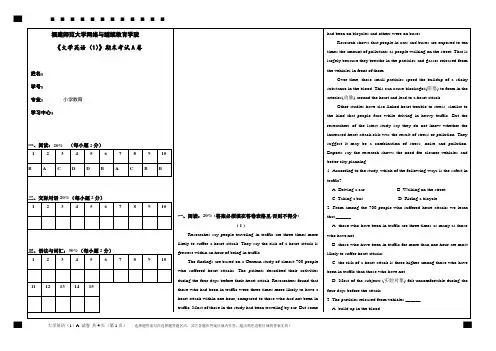
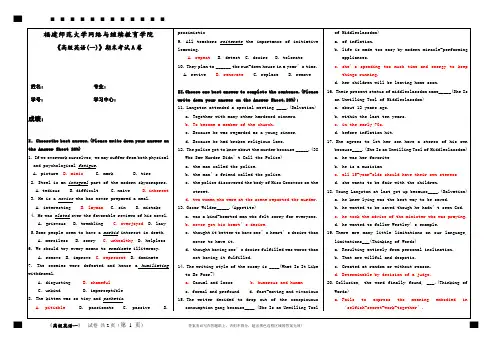
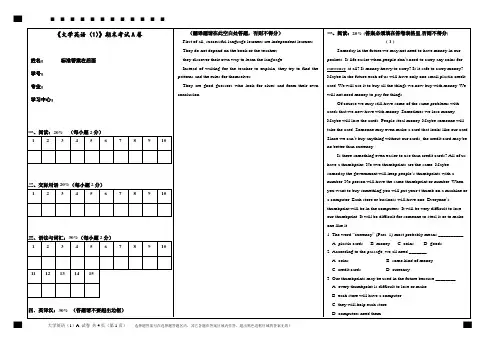
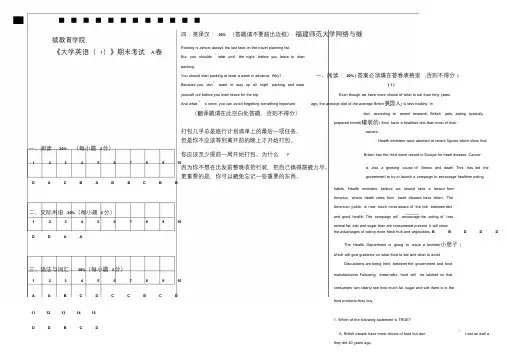
▆■■■■■■■■■■■■四.英译汉:30% (答题请不要超出边框)福建师范大学网络与继续教育学院《大学英语(1)》期末考试 A 卷Packing is almost always the last task on the travelplanning list.But you shouldn ’wtait until the night before youleave to startpacking.You should start packing at least a week in advance. Why? 一、阅读:20% (答案必须填在答卷表格里,否则不得分)Because you don’twant to stay up all night packing and wear ( 1 )yourself out before you even leave for the trip. Even though we have more choice of what to eat than forty yearsAnd what ’s more, you can avoid forgetting something important. ago, the average diet of the average Briton英( 国人) is less healthy. In(翻译题请在此空白处答题,否则不得分)fact, according to recent research, British pets, eating speciallyprepared tinned(罐装的) food, have a healthier diet than most oftheir打包几乎总是旅行计划清单上的最后一项任务。
owners.但是你不应该等到离开前的晚上才开始打包。
Health ministers were alarmed at recent figures which show that一、阅读:20% (每小题 2 分)你应该至少提前一周开始打包。
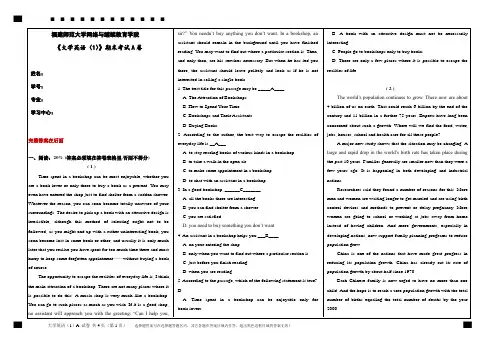
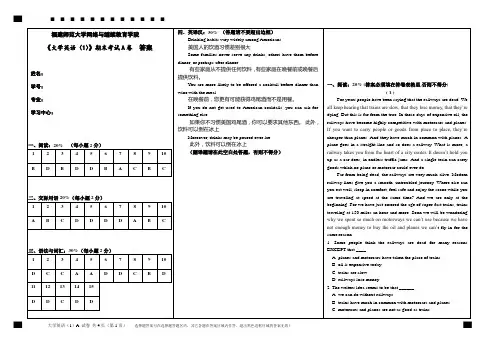
▆■■■■■■■■■■■■▆▆■■■■■■■■■■■■A. I prefer a window seat.B. I like neither.C. Both will do.D. I don’t know.9. —You look tired. What’s the matter?—______________A.It doesn’t matter.B. Oh, my head aches badly.C. It is not the matter.D. Don’t worry.10. — Have you ever been to the Great Wall in Beijing?—__________A. Yes, I am .B. No, I don’t.C. No, I’ve never been there.D. Certainly, I went there.三、语法与词汇:30%(答案必须填在答卷表格里,否则不得分)1. We all believe that computer ______ smaller and smaller in the coming years.A. can be becomeB. will be gotC. will be changedD. can turn2. He ___________________ not to leave waste paper in public places any more.A. warnsB. warnedC. is warnedD. was warned3. That factory _________ nearly 50 years ago.A. has been builtB. had builtC. was builtD. has built4. Don’t worry. Everything will _____________ in time.A. be finishedB. finishC. finishedD. be finishing5. Her application for the position _______________ by the boss.A. was refusedB. was refusingC. refusedD. is refusing6. He__________ the Communist Party_____________2002.A. has joined, inB. has joined, sinceC. joined, onD. joined, in7. Jack_________ in the street when I_________ on him.A. walked…calledB. was walking …was callingC. walked … was callingD. was walking …called8. “Where is Mary?”“She__________ to school.”A. will goB. has beenC. has goneD. went9. This time last year I___________ my holiday in the countryside.A. haveB. was havingC. am havingD. have had10. I’m sorry that I__________ you had been there already.A. won’t knowB. didn’t knowC. don’t knowD. haven’t known11. By the end of 2020 China _____________ much stronger and richer.A. will becomeB. would becomeC. is becomingD. will have become12. It _______________ years since I last saw you.A. wasB. isC. will beD. has been13. I __________ my homework now.A. finishB. finishedC. have finishedD. had finished14. The room _____________ often cleaned by the worker.A. hasB. will beC. wasD. is15. The railway ______________ in three years.A. is completeB. will completedC. has completedD. will be completed四.英译汉:30%Drinking habits vary widely among Americans.Some families never serve any drinks, others have them before dinner, or perhaps after dinner.You are more likely to be offered a cocktail before dinner than wine with the meal.If you do not get used to American cocktails, you can ask for something else.Moreover, drinks may be poured over ice.(翻译答案必须填写在第1页答卷上,不要在此处答题,否则不得分)。
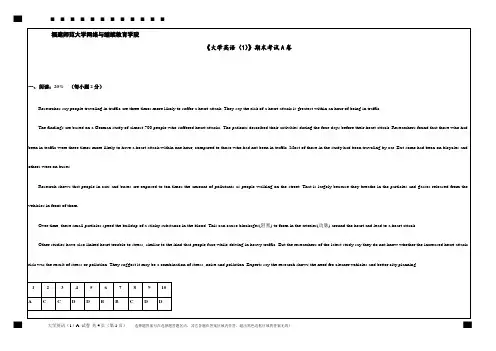
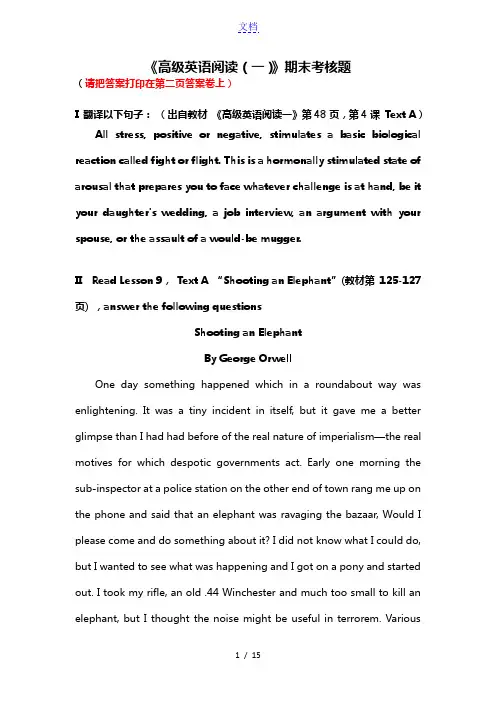
《高级英语阅读(一)》期末考核题(请把答案打印在第二页答案卷上)I 翻译以下句子:(出自教材《高级英语阅读一》第48页,第4课Text A)All stress, positive or negative, stimulates a basic biological reaction called fight or flight. This is a hormonally stimulated state of arousal that prepares you to face whatever challenge is at hand, be it your daughter's wedding, a job interview, an argument with your spouse, or the assault of a would-be mugger.II Read Lesson 9,Text A “Shooting an Elephant”(教材第125-127页) ,answer the following questionsShooting an ElephantBy George OrwellOne day something happened which in a roundabout way was enlightening. It was a tiny incident in itself, but it gave me a better glimpse than I had had before of the real nature of imperialism—the real motives for which despotic governments act. Early one morning the sub-inspector at a police station on the other end of town rang me up on the phone and said that an elephant was ravaging the bazaar, Would I please come and do something about it? I did not know what I could do, but I wanted to see what was happening and I got on a pony and started out. I took my rifle, an old .44 Winchester and much too small to kill an elephant, but I thought the noise might be useful in terrorem. VariousBurmans stopped me on the way and told me about the elephant's doings, it was not, of course, a wild elephant, but a tame one which had gone "must." It had been chained up, as tame elephants always are when their attack of "must" is due, but on the previous night it had broken its chain and escaped. Its mahout, the only person who could manage it when it was in that state, had set out in pursuit, but had taken the wrong direction and was now twelve hours' journey away, and in the morning the elephant had suddenly reappeared in the town. The Burmese population had no weapons and were quite helpless against it. It had already destroyed somebody's bamboo hut, killed a cow and raided some fruit-stalls and devoured the stock; also it had met the municipal rubbish van and, when the driver jumped out and took to his heels, had turned the van over and inflicted violence upon it.The Burmese sub-inspector and some Indian constables were waiting for me in the quarter where the elephant had been seen. It was a very poor quarter, a labyrinth of squalid bamboo huts, thatched with palm-leaf, winding all over a steep hillside. I remember that it was a cloudy, stuffy morning at the beginning of the rains...There was a loud, scandalized cry of "Go away, child! Go away this instant!" and an old woman with a switch in her hand came round the corner of a hut, violently shooing away a crowd of naked children. Some more women followed, clicking their tongues and exclaiming; evidently there wassomething that the children ought not to have seen. I rounded the hut and saw a man's dead body sprawling in the mud. He was an Indian, a black Dravidian coolie, almost naked, and he could not have been dead many minutes. The people said that the elephant had come suddenly upon him round the corner of the hut, caught him with its trunk, put its foot on his back and ground him into the earth... As soon as I saw the dead man I sent an orderly to a friend's house nearby to borrow an elephant rifle.The orderly came back in a few minutes with a rifle and five cartridges, and mean-while some Burmans had arrived and told us that the elephant was in the paddy fields below, only a few hundred yards away. As I started forward practically the whole population of the quarter flocked out of the houses and followed me. They had seen the rifle and were all shouting excitedly that I was going to shoot the elephant. They had not shown much interest in the elephant when he was merely ravaging their homes, but it was different now that he was going to be shot. It was a bit of fun to them, as it would be to an English crowd; besides they wanted the meat. It made me vaguely uneasy. I had no intention of shooting the elephant I had merely sent for the rifle to defend myself if necessary w and it is always unnerving to have a crowd following you. I marched down the hill, looking and feeling a fool, with the rifle over my shoulder and an ever-growing army of people jostling atmy heels. At the bottom, the elephant was standing eight yards from the road, his left side towards us. He took not the slightest notice of the crowd's approach. He was tearing up bunches of grass, beating them against his knees to clean them and stuffing them into his mouth.I had halted on the road. As soon as I saw the elephant I knew with perfect certainty that I ought not to shoot him. It is a serious matter to shoot a working elephant it is comparable to destroying a huge and costly piece of machinery m and obviously one ought not to do it if it can possibly be avoided. And at that distance, peacefully eating, the elephant looked no more dangerous than a cow. I thought then and I think now that his attack of "must" was already passing off; in which case he would merely wander harmlessly about until the mahout came back and caught him. Moreover, I did not in the least want to shoot him. I decided that I would watch him for a little while to make sure that he did not turn savage again, and then go home.But at that moment, I glanced round at the crowd that had followed me. It was an immense crowd, two thousand at the least and growing every minute. It blocked the road for a long distance on either side. I looked at the sea of yellow faces above the garish clothes—faces all happy and excited over this bit of fun, all certain that the elephant was going to be shot. They were watching me as they would watch a conjuror about to perform a trick. They did not like me, but with the magical riflein my hands I was momentarily worth watching. And suddenly I realized that I should have to shoot the elephant after all. The people expected it of me and I had got to do it; I could feel their two thousand wills pressing me forward, irresistibly. And it was at this moment, as I stood there with the rifle in my hands, that I first grasped the hollowness, the futility of the white man's dominion in the East. Here was I, the white man with his gun, standing in front of the unarmed native crowd—seemingly the leading ac- tor of the piece; but in reality I was only an absurd puppet pushed to and fro by the ,Mil of those yellow faces behind. I perceived in this moment that when the white man turns tyrant it is his own freedom that he destroys. He becomes a sort of hollow, posing dummy, the conventionalized figure of a sahib. For it is the condition of his rule that he shall spend his tire in trying to impress the "natives," and so in every crisis he has got to do what the "natives" expect of him. He wears a mask, and his face grows to fit it. I had got to shoot the elephant. I had committed myself to doing it when 1 sent for the rifle. A sahib has got to act like a sahib; he has got to appear resolute, to know his own mind and do definite things. T o come all that way, rifle in hand, with two thousand people marching at my heels, and then to trail feebly away, having done nothing—no, that was impossible. The crowd would laugh at me. And my whole life, every white man's life in the East, was one long struggle not to be laughed at.It was perfectly clear to me what I ought to do. I ought to walk up to within, say, twenty-five yards of the elephant and test his behavior. If he charged, I could shoot; if he took no notice of me, it would be safe to leave him until the mahout came back. But also 1 knew that I was going to do no such thing. I was a poor shot with a rifle and the ground was soft mud into which one would sink at every step. If the elephant charged and I missed him, I should have about as much chance as a toad under a steam-roller. But even then I was not thinking particularly of my own skin, only of the watchful yellow faces behind. For at that moment, with the crowd watching me, I was not afraid in the ordinary sense, as I would have been ill had been alone. A white man mustn't be frightened in front of "natives"; and so, in general, he isn't frightened. The sole thought in my mind was that if anything went wrong those two thousand Burmans would see me pursued, caught, trampled on and reduced to a grinning corpse like that Indian up the hill. And if that happened it was quite probable that some of them would laugh. That would never do. There was only one alternative. I shoved the cartridges into the magazine and lay down on the read to get a better aim.Afterwards, of course, there were endless discussions about the shooting of the elephant. The owner was furious, but he was only an Indian and could do nothing. Besides, legally I had done the right thing, for a mad elephant has to be killed, like a mad dog, if its owner fails tocontrol it. Among the Europeans opinion was divided. The older men said I was right, the younger men said it was a damn shame to shoot an elephant for killing a coolie, because the elephant was worth more than any damn Coringhee coolie. And afterwards I was very glad that the coolie had been killed; it put me legally in the right and it gave me sufficient pretext for shooting the elephant. I often wondered whether any of the others grasped that I had done it solely to avoid looking a fool.1.How did the writer get involved in the incident in the very beginning?2. what did the writer learn or realize from this story?III Read Lesson 6 Text B“Unwilling to School”Judge whether the following statements are true or false.:(阅读教材第6课课文B,判断对错)Unwillingly to SchoolBy Katrin Fitz HerbertEvery child with a poor school attendance record is a child in danger. At best, he is in danger of not fulfilling his educational potential; at worst,he is in danger of cruelty or neglect.Enforced school absence in childhood is sometimes used by adults to justify their own career failure. It is difficult for a child to play truant regularly if his parents are keen for him to attend school. Much truancy is openly condoned; as for the rest, not knowing that your children play truant is equivalent to not ensuring that they are at school. It shows lack of interest in their whereabouts, apathy about their education, or inability to control them —i.e., ineffective parents...The characteristics which lead families to reject regular schooling are likely to have other detrimental effects on the children besides educational failure. For what could make parents decide that the most widely agreed route to secure employment, social acceptance and personal satisfaction is not for them? The first reason is a general difficulty in dealing with family responsibilities, particularly in the stressful environment of modern cities. Getting the child to school on time is too much to cope with (alarm clock, breakfast, clothes, shoes, gym clothes, lunch money). Secondly, the child's company may comfort a depressed, isolated mother.The school's insistence on uniforms or other obligations and, possibly, its undisguised disapproval of an "inadequate" family, may be the last straw. Children who grow up in such families are likely to be deprived in many ways besides education.In these families, education is written off as a waste of time. For a child growing up, this is possibly more serious than the loss of education. Habitual non-attendance can accustom children very early in their lives to rejecting the values and legal requirements of society. It is a training in deviance and anti-social behaviour which can lay the foundation for a generally deviant career. The common progression from truancy or parentally-condoned absence to juvenile crime has been reliably established.In greatest danger of all is the child who successfully plays truant for long periods without his parents' knowledge. His personal isolation and alienation, not just from conventional behaviour but from his own family, puts him in danger of delinquency, drugs or mental illness in later life. Truancy has been called the "kindergarten of crime", and bad school attendance spells failure and possible unemployment in later life.It was soon realized that non-attendance was too complex and serious a problem to be dealt with by education departments alone. Much responsibility for school attendance was, therefore, transferred to social workers. This move has, on its own, however, possibly created as many problems as it has solved. This is because the seriousness with which they regard non-attendance is an issue on which social workers and workers in education differ. Social workers tend to regard it as merely one symptom of social failure which, particularly if homelessness,physical neglect, marital problems and illness are present, does not justify more attention than the rest.Workers in education consider the other problems as all the more reason why the children concerned should have the advantage of regular schooling. The longer they stay truant, the greater are their chances of getting into further trouble. One chief education welfare officer told me: "The best form of social service you can do for deprived children is to see that they receive education in the normal school setting."I was given access to a few cases of nine-year-old children selected by their head teacher for causing concern due to problems arising outside school. I read their files and talked to the workers involved about how each, from his professional point of view, saw the chain of events since the initial referral. In cases concerned with school absence, this method produced a commentary of the slow progression towards stalemate which can occur when two departments with different priorities are jointly responsible for solving the same problem. For how can a decisive plan for action ever be formed if it depends on the cooperation of two people who basically disagree?Non-attendance can so injure a child's life chances that it deserves to be tackled by a more single-minded attack than this. A concerted policy should focus on the following areas: first, the school's own capacity for holding the interest of pupils; second, its efficiency inregistering unexplained absences; third, school-oriented social work; fourth, boarding schools; and fifth, public attitude.The general climate of a school is obviously a powerful factor in a child's decision to play truant, so creating an acceptable school atmosphere is one of the most challenging assignments teachers face. It must, however, be distinguished from the separate task of setting up efficient machinery for following up suspected truants. This consists of treating any unexplained absence—even lateness, which is often an indication of absence to come as serious. If the school immediately queries the first and subsequent unexplained absence, it will be much more difficult for the child to become a habitual absentee.The school's success in keeping non-attendance to a minimum also depends on the effectiveness of its education welfare officer, the official link between school and home. Ideally, when alerted about a suspected absence, he makes an immediate home visit to see what has gone wrong. In the first instance he may simply go to "collect excuses", gradually forming his own idea of the real reason for the child's absence the child is bullied at school, the mother is unhappy when the child is at school, the family does not get up in time, the parents don't know about the truancy, the child has not got a uniform, and so on. Though the officer will do what he can to alleviate any problem he stumbles on, his main interest is to get the child back to school.Another ingredient of a general attack on chronic non-attendance should be boarding education. Every Education Welfare Officer has his core of cases of children whose parents do not believe in education; who have such psychological problems of their own that they need their children for company or who are so anti-authority that they will not hand their children over to any representatives of the "establishment" they detest. These are the parents with whom the officer, and the school or social workers get nowhere and whose children get no education to speak of, if left in their home environment.Teachers, education welfare officers and social workers are sometimes excessively reluctant to consider boarding school. They regard it as a punitive action with a certain finality for the child. Many referrals are, therefore, made too late to be really useful. Sending a child to a boarding school should be to improve a situation which is not going well. However, everybody is so wary of it, that we tend to use it when it is really too late; when parents are ready to be relieved of a child who is a problem—thus giving the child good reason to feel rejected. When the child is still wanted, and sent to boarding school against his parents' will, then it can really solve the problem by answering the child's educational needs, without destroying family bonds.Finally, the public apathy towards truancy is a positive incentive to children who have difficulties at school. The man in the street, even whenknocked sideways by a diminutive footballer during school hours, merely curses and walks on. Would absence rates be any different if the public occasionally "had a go" at obvious non-attenders and encouraged them to give their teachers another chance to make school worthwhile for them?1.Every child with poor school attendance record is unable to fulfill his educational potential and is going to suffer cruelty or neglect.2. Many parents do not know that their children play truant regularly, which shows their lack of interest in their children’s education or inability to control them.3. Parent’s difficulty in dealing with family responsibility is not a reason which leads families to reject regular schooling.4. Habitual non-attendance can cause children reject the values and legal requirements of society very early in their lives.5. Truancy or parentally-condoned absence may or may not lead to juvenile crime.6. Mental illness in later life is another bad effect of truancy.7. Non-attendance is such a complex and serious problem that it can’t be dealt with by education department alone.8. According to this passage, the social workers and educational department didn’t cooperate very well because they disagreebasically.9. According to the writer ,registering unexplained absence is not very effective to resolve regular non-attendance.10. Unlike the parents, the teachers , social workers and education welfare officers are unwilling to send truants to boarding school in the early stage.答案卷I,TranslationII,Answer questions:1.2.III判断对错:1-5:_____6-10 :_____。
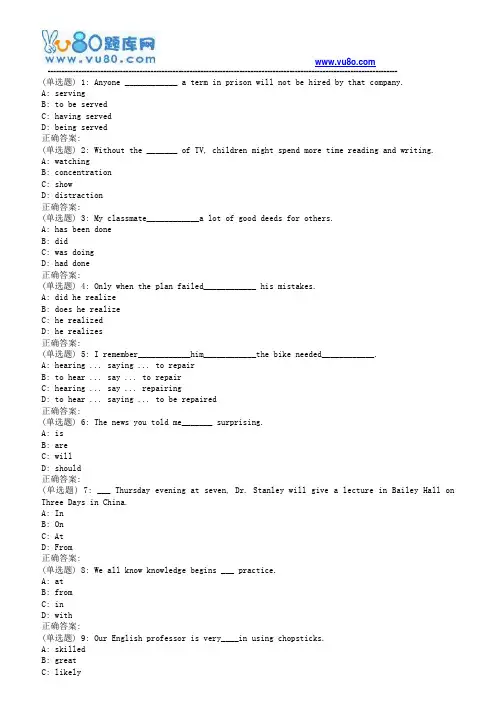
(单选题) 1: Anyone ____________ a term in prison will not be hired by that company.A: servingB: to be servedC: having servedD: being served正确答案:(单选题) 2: Without the _______ of TV, children might spend more time reading and writing.A: watchingB: concentrationC: showD: distraction正确答案:(单选题) 3: My classmate____________a lot of good deeds for others.A: has been doneB: didC: was doingD: had done正确答案:(单选题) 4: Only when the plan failed____________ his mistakes.A: did he realizeB: does he realizeC: he realizedD: he realizes正确答案:(单选题) 5: I remember____________him____________the bike needed____________.A: hearing ... saying ... to repairB: to hear ... say ... to repairC: hearing ... say ... repairingD: to hear ... saying ... to be repaired正确答案:(单选题) 6: The news you told me_______ surprising.A: isB: areC: willD: should正确答案:(单选题) 7: ___ Thursday evening at seven, Dr. Stanley will give a lecture in Bailey Hall on Three Days in China.A: InB: OnC: AtD: From正确答案:(单选题) 8: We all know knowledge begins ___ practice.A: atB: fromC: inD: with正确答案:(单选题) 9: Our English professor is very____in using chopsticks.A: skilledB: greatC: likelyD: good正确答案:(单选题) 10: —This box is too heavy for me to carry upstairs. —________.A: You may ask for help.B: Let me give you a hand.C: Please do me a favor.D: I'd come to help.正确答案:(单选题) 11: She divided the cake into three pieces and gave her three children ___ a peice. A: everyB: allC: bothD: each正确答案:(单选题) 12: ____________that we went outing.A: The weather so fineB: So fine the weather isC: So the weather was fineD: So fine was the weather正确答案:(单选题) 13: They are considering ____________ before the prices go up.A: of buying the houseB: with buying the houseC: buying the houseD: to buy the house正确答案:(单选题) 14: "I'm sorry to have kept you waiting." "Oh, not at all. I ____________here only a few minutes."A: have beenB: had beenC: wasD: will正确答案:(单选题) 15: I’m going to Xi'an next week. Have you anything ____________to your parents?A: to takeB: to be takenC: to be bought toD: to buy正确答案:(单选题) 16: —Do you mind telling me where you're from? —_________.A: Certainly. I'm from LondonB: Sure. I was born in LondonC: Not really, you can do itD: Certainly not. I'm from London正确答案:(单选题) 17: — You should have thanked her before you left.— I meant____________, but when I was leaving I couldn't find her anywhere.A: to doB: toC: doingD: doing so正确答案:(单选题) 18: They are from__________.They are_________.A: Germany;GermenB: German;GermanyC: Germany;GermanD: Germany;Germans正确答案:(单选题) 19: —It's cold in here. Do you mind if I close the door? —_______.A: With pleasureB: Yes, pleaseC: Of course notD: Thank you正确答案:(单选题) 20: His tone ___________ his real feelings more truly than his words.A: broughtB: conveyedC: handedD: fetched正确答案:(单选题) 21: If I ____you, I would go by plane. Flying is much faster.A: beB: wasC: wereD: am正确答案:(单选题) 22: The landlady ___ us bread and milk.A: offeredB: recoveredC: receivedD: confronted正确答案:(单选题) 23: I went to the post office,only_____ it was closed.A: findingB: to findC: to be findingD: found正确答案:(单选题) 24: —Would you please give him the paper the moment he ______? —No problem.A: arrivesB: will arriveC: arrivedD: is arriving正确答案:(单选题) 25: The town is about _________ ride from here.A: two hourB: two hour'sC: two hours'D: two-hours正确答案:(单选题) 26: I admired my classmate Lisa very much. ______ her prettiness, she was smart and helpful.A: Except forB: But forC: Apart fromD: In spite of正确答案:(单选题) 27: After her husband died, she ___ another man in 1964.A: marriedB: married withC: married toD: was married to正确答案:(单选题) 28: The meeting ____________next week is sure to be a great success.A: to take placeB: to be taken placeC: to have taken placeD: being taken place正确答案:(单选题) 29: Since the cinema was ___ , I had to go home to watch TV.A: packedB: crowdedC: filled withD: full of正确答案:(单选题) 30: Jack____________ in the street when I____________on him.A: walked... calledB: was walking ... was callingC: walked ... was callingD: was walking...called正确答案:(单选题) 31: —Tomorrow is my birthday. —__________.A: Oh, I have a good idea.B: I am glad you like it.C: Many happy returns of the day!D: You must be very happy.正确答案:(单选题) 32: Look, this roof is covered with____________leaves.A: fallingB: fallenC: fellD: felt正确答案:(单选题) 33: The President____________ went to see the flood-stricken areas.A: himselfB: didC: is saidD: has正确答案:(单选题) 34: —May I see the menu, please? I've been waiting an hour already. —_________. A: That is the menu, sirB: Yes, please go onC: Here you are, sirD: Of course, sir正确答案:(单选题) 35: With the problem ____________ , we are getting along even more smoothly.A: settlesB: to settleC: settledD: to be settling正确答案:(单选题) 36: This is not my bike.It's ____________.A: MaryB: Mary'sC: of MaryD: the bike of Mary正确答案:(单选题) 37: —Oh, I'm sorry. But I promise I'll be careful next time. —___________________. A: It's nothing at allB: Oh, never mind. It doesn't matterC: Thank youD: There are no questions正确答案:(单选题) 38: The complicated problem can be solved by the computer within ____________ a few seconds.A: evenB: justC: exactD: very正确答案:(单选题) 39: Although I had read the book assigned by the professor several times, it didn't make any__ to me.A: meaningB: importanceC: senseD: significance正确答案:(单选题) 40: Such problems ____________ as soon as possible.A: have solvedB: have been solvingC: have to solveD: have to be solved正确答案:(单选题) 41: Middle school boys____________not to smoke.A: always tellB: are told alwaysC: are always toldD: is always told正确答案:(单选题) 42: Will you lend him a magazine ____________?A: to be readB: for readingC: to readD: he read正确答案:(单选题) 43: He ____________the Communist Party____________2002.A: has joined, inB: has joined, sinceC: joined, onD: joined, in正确答案:(单选题) 44: If you ever have the ___ to go abroad to study, you should take it.A: chanceB: possibilityC: offerD: luck正确答案:(单选题) 45: You will be given a ticket if you ______ the speed limit.A: proceedB: exceedC: succeedD: precede正确答案:(单选题) 46: No one can avoid ____________by advertisements.A: to be influencedB: being influencedC: influencingD: having influenced正确答案:(单选题) 47: "Did you enjoy last night's concert?""Yes. Though the last piece____________rather poorly. "A: was playedB: playedC: was playingD: playing正确答案:(单选题) 48: An army spokesman stressed that all the soldiers had been ordered____________clear warnings before firing any shots.A: to issueB: being issuedC: to have issuedD: to be issued正确答案:(单选题) 49: You should make _______ your house or flat is secure.A: sureB: certainC: understandingD: knowledge正确答案:(单选题) 50: A party is the____________ activity I want to take part in.A: justB: goodC: mostD: very正确答案:(单选题) 1: Anyone ____________ a term in prison will not be hired by that company.A: servingB: to be servedC: having servedD: being served正确答案:(单选题) 2: Without the _______ of TV, children might spend more time reading and writing.A: watchingB: concentrationC: showD: distraction正确答案:(单选题) 3: My classmate____________a lot of good deeds for others.A: has been doneB: didC: was doingD: had done正确答案:(单选题) 4: Only when the plan failed____________ his mistakes.A: did he realizeB: does he realizeC: he realizedD: he realizes正确答案:(单选题) 5: I remember____________him____________the bike needed____________. A: hearing ... saying ... to repairB: to hear ... say ... to repairC: hearing ... say ... repairingD: to hear ... saying ... to be repaired正确答案:(单选题) 6: The news you told me_______ surprising.A: isB: areC: willD: should。
福师1108考试批次《大学英语(1)》复习题一及参考答案一、阅读:30%( 1 )We are all called upon to make a speech sometime in life, but most of us don’t do a very good job. We may get nervous, forget what we want to say, or talk too long and bore our audience. Later we may think, “Thank goodness, it’s over. I’m not good at public speaking. I hope I never have to do that again.”It doesn’t have to be that bad. Here are some simple steps to take the pain out of speech-making. First of all, it is important to plan. Find out everything you can about your subject. And, at the same time, find out as much as you can about your audience. Who are they? Why are they coming to hear you speak? Put yourself in their shoes as you prepare your speech.Ask yourself the purpose of your speech. What is the occasion? Why are you speaking? There are many possible speaking roles, and each one has its own special characteristics. Don’t spoil your speech by confusing one speaking role with another.When you are making your speech, try to relax. Speak slowly and clearly and look at people in your audience. Use simple vocabulary and expressions whenever possible. Pause for a few seconds now and then to give your audience a chance to think about what you have said.If you follow these st eps, you’ll see that you don’t have to be afraid of public speaking.1. According to the first paragraph, which of the following statements is NOT true?A. We may make mistakes when making a public speech.B. Most of us don’t know how to make a good pu blic speech.C. Every one of us hopes to have the chance to speak in public.D. We may think that we can never make a good speech.2. What does “put yourself in their shoes” in paragraph2 mean?A. Be sure to wear nice clothing when you give your speech.B. Try on their shoes to see if they fit you.C. Try to imagine how they think and feel about your speech.D. Take your shoes off when making your speech.3. What if you confuse one speaking role with another?A. You will ruin your speech and make it a failure.B. Your speech will become a complete success.C. You will spoil your audience.D. You will spoil yourself.4. While making a speech, you are NOT supposed to _______.A. speak slowly and clearlyB. look at people in your audienceC. use simple vocabulary and expression whenever possibleD. be serious5. What is the passage mainly about?A. How to improve your speaking ability.B. One should always make a short speech.C. How to overcome your tension.D. The pleasure in making a public speech.( 2 )Online learning is also called distance education. Many American colleges and universities have been offering it for years.One example is New York University in Manhattan. The School of Continuing and Professional Studies began online classes in nineteen ninety-two. Its Virtual College has taught more than ten thousand students from across the United States and other countries.Last year, the School of Continuing and Professional Studies launched NYU Online. It offers NYU's first online programs to earn a bachelor's degree. Programs are offered in three areas: leadership and management, information systems management and social sciences. University officials say classes are highly interactive, where students communicate with each other and their teachers. Some classes require students to all log in at the same time so they can attend live lectures by a professor. Students can also ask questions and work together on team projects. The university says classes are taught by NYU professors who have been trained in online teaching.International students must take two admissions tests before they can be accepted into the program. These are the SAT and the TOEFL. We will discuss these tests later in our series.The cost to attend NYU Online depends on how many classes a student takes. It can cost as much as fifteen thousand dollars a year. NYU offers no financial aid for international students in this program. You can get more details at .6. When did New York University start its online classes?A. In 1990.B. In 1998.C. In 1992.D. In 1982.7. Which of the following is NOT included in the online programs offering a BA degree?A. Information Systems Management.B. Finance and Economy.C. Leadership and Management.D. Social Sciences.8. What can the students do in the online learning programs?A. Communicate with each other and the teacher.B. Attend classes and lectures together.C. Ask questions and work together on team projects.D. Both A and C.9. International students can be accepted into the program after ____________ .A. they take the SAT and the TOFELB. they go to New York UniversityC. they apply and log inD. two years in the United States10. How much does the online learning program cost per year?A. $15, 000.B. $1, 500.C. It depends.D. $5, 000.( 3 )Versailles is the site of the Palace of Versailles, one of the most storied buildings in the history of France. It was originally built as a hunting chateau by King Louis VIII in 1624. In 1669, King Louis XIV began searching for a grand site where he could conduct the affairs of France and control the government. He settled on the hunting palace and expanded it into the world’s largest palace. In addition, the King hoped to build a governmental center apart from Paris.The palace took 36,000 workers fifty years to build. The palace is spread out over 280 acres and can house 20,000 people! The palace features over 700 rooms and 67 staircases. There are dozens of unique rooms, features, gardens, and halls. One of the most renowned rooms of the Palace of Versailles is the Hall of Mirrors. Recently restored, the Hall of Mirrors is the centerpiece of the dazzling building. Originally added to the palace in 1684, the Hall of Mirrors was built to be a dazzling display of the power and wealth of the French Monarchy. The hall, which measures 73 meters in length features 357 gold-coated stucco mirrors, ornate paintings, crystal chandeliers, marble fixtures, a parquet floor, and ceilings with colorful murals painted by artist Charles Le Brun. The Hall of Mirrors has also played a prominent role in history. Both the proclamation of the German Empire in 1871 after the Franco-Prussian War and the signing of the Treaty of Versailles that formally ended World War One were signed here.11. When was the Palace of Versailles originally built?A. In 1684.B. In 1624.C. In 1669.D. In 1786.12. Why did King Louis XIV want a grand palace?A. So he and his queen could retire comfortably.B. As a hunting chateau.C. As a place to conduct his nation's business.D. He wanted to impress his wife.13. Which of the following is NOT true?A. The Hall of Mirrors has been recently restored.B. The Hall of Mirrors is considered the centerpiece of the Palace of Versailles.C. The Hall of Mirrors features a parquet floor.D. Two major treaties were signed in the Hall of Mirrors.14. Which of the following is not mentioned as a feature of the Hall of Mirrors?A. Bronze moldings .B. Ornate paintings.C. Marble fixtures.D. Crystal chandeliers.15. Which of the following could be an appropriate title for this passage?A. Louis XIV and the Palace of Versailles.B. The ceilings of the Hall of Mirrors.C. The Amazing Palace of Versailles.D. A History of France.参考答案:一、CCADA CBDAC BCDAC二、语法与词汇:40%1. As a result of my laziness, I failed ________ my work in time.A. and finishedB. to finishC. and finishingD. to finished2. I am sorry ______ written you a letter at the time.A. to have notB. to not haveC. not to haveD. not having3. Will you lend him a magazine _________?A. to be readB. for readingC. to readD. he read4. He could do nothing but _______for the bus _________.A. wait, to comeB. wait; comeC. waiting; comingD. waited; came5. I’ve enjoyed _________ to talk with you.A. to be ableB. being ableC. to been ableD. of being able6. No one can avoid _________ by advertisements.A. to be influencedB. being influencedC. influencingD. having influenced7. They are considering _________ before the prices go up.A. of buying the houseB. with buying the houseC. buying the houseD. to buy the house8. He thought that _________.A. the effort doing the job was not worthB. the effort was not worth in doing the jobC. it was not worth the effort doing the jobD. it was not worth the effort by doing the job9. Tim ________a great number of different places in Australia.A. already has visitedB. has already visitedC. has visited alreadyD. has ever visited10. Up to now I_________ very successful.A. am notB. haven’t beenC. was notD. were not11. John does a lot of housework every evening, but now he ____________his schoolmates with their lessons.A. helpB. is helpingC. helpsD. has helped12. The song ____________by children.A. is often sungB. was often sungC. singsD. has often sung13. It____________hard when I left the house.A. is rainingB. rainsC. was rainingD. will rain14. An army spokesman stressed that all the soldiers had been ordered____________clear warnings before firing any shots.A. to issueB. being issuedC. to have issuedD. to be issued15. Do I have to take this medicine? It ____________ so terrible.A. tastesB. is tastingC. is tastedD. has tasted16. When I was a child, my teacher told me that the earth ____________round.A. wasB. had beenC. has beenD. is17. Since computers were invented, it ____________ that they are indispensable for scientific research.A. thoughtB. has been thoughtC. is thinkingD. had thought18. He was told that after he graduated he ____________ by a company.A. would be employedB. would get employedC. would be employingD. would employ19. The steps of progress in society ____________ of as having happened in a short time.A. must not thinkB. must not be thoughtC. must thinkD. thought20. That factory ____________ nearly 50 years ago.A. has been builtB. had builtC. was builtD. has built参考答案:二、BCCAB BCBBB BACBA DBABC三、交际用语(此部分共有5个未完成的对话,针对每个对话中未完成的部分有4个选项,请你从A、B、C、D四个选项中,选出最佳选项。
I’m afraid I can’t finish the work____________ to help me.A、unless you will comeB、unless you comeC、until you will comeD、until you shall comeWe can go when the ground _______.A、is dryingB、has driedC、driedD、dry3.(2.0分)“I’m sorry to have kept you waiting.”“Oh, not at all. I_________here only a few minutes.”A、have beenB、had beenC、wasD、will4.(2.0分)Various programs__________ on TV. World news____________ best received.A、will show, areB、are shown, isC、are showing, isD、have shown, are5.(2.0分)I can’t find my dictionary. I wonder whether Mary _____it now.A、haveB、hasC、is havingD、had6.(2.0分)by the end of 2020 china _____________much stronger and richer.A、will becomeB、would becomeC、is becomingD、will have become7.(2.0分)It ___________ years since I last saw you.A、wasB、isC、will beD、has been8.(2.0分)tom ___________ his lessons from seven to eight last night.A、was doingB、had doneC、were takenD、had been taken9.(2.0分)He ______________thin. What’s happened to him?A、was gettingB、is gettingC、will gettingD、had been got10.(2.0分)I __________ my homework now.A、finishB、finishedC、have finishedD、had finished11.(2.0分)If you ________quiet, I’ll tell you what happened.A、beB、are to beC、areD、will be12.(2.0分)Middle school boys _____________ not to smoke.A、always tellB、are told alwaysC、are always toldD、is always told13.(2.0分)He said that he________to the United States.A、had never beenB、had never goneC、was neverD、has never been14.(2.0分)This time last year I___________ my holiday in the countryside.A、haveB、was havingC、am havingD、have had15.(2.0分)“Where is Mary?”“She__________ to school.”A、will goB、has beenC、has goneD、went16.(2.0分)(交际用语)— Hello, this is David speaking. Is Michael there? — ________________.A、Hold on. I’ll get him.B、No, he isn’t.C、Yes, I am David.D、Yes, what do you want?17.(2.0分)(交际用语)— which one do you prefer, the window seat or the aisle seat?—_____________.A、I prefer a window seat.B、I like neither.C、Both will do.D、I don’t know.18.(2.0分)(交际用语)— Mr. Smith, must we hand in our composition next Monday?—____________.A、Yes, you will.B、Yes, you must. It’s the deadline.C、No, you mustn’t.D、You can wait.19.(2.0分)(交际用语)— i think the movie is really exciting and touching.—____________A、So am I.B、So do I.C、Neither do I.D、The same to you.20.(2.0分)(交际用语)— Have you ever been to the Great Wall in Beijing?—__________A、Yes, I am.B、No, I don’t.C、No, I’ve never been there.D、Certainly, I went there.21.(2.0分)(交际用语)— You’ve won the basketball game. Congratulations!—____________.A、Oh, not really.B、No one else could do it.C、Thank you. We’re really lucky.D、It’s good of you to say so.22.(2.0分)(交际用语)— Would you mind doing me a favor now?—____________.A、No, of course.B、Yes, help yourself.C、No, of course not.D、Sure, go ahead.23.(2.0分)(交际用语)— Excuse me,Sir. Could you hold the suitcase for me? —____________.A、It’s a pleasure.B、My pleasure.C、I could.D、With pleasure.24.(2.0分)(交际用语)— It’s really nice of you to give me a hand in time! —____________.A、Thank you.B、No, no.C、With pleasure.D、It’s my pleasure.25.(2.0分)(交际用语)— How soon do you want to leave for the picnic?—____________.A、sooner or later.B、Be Quick.C、As I like.D、In an hour。
▆
▆
▆■■■■■■■■■■■■
3. — Mr. Smith, must we hand in our composition next Monday? —____________
A. Yes, you will.
B. Yes, you must. It’s the deadline.
C. No, you mustn’t.
D. You can wait.
4. — You look tired. What’s the matter?
—______________
A. It doesn’t matter.
B. Oh, my head aches badly.
C. It is not the matter.
D. Don’t worry.
5. — Mary, help yourself to some salad.
—____________
A. I don’t like salad.
B. Sorry, I can’t help.
C. Thanks, but I’ve had enough.
D. No, I can’t.
6. —You’ve won the basketball game. Congratulations!
—____________
A. Oh, not really.
B. No one else could do it.
C. Thank you. We’re reall y lucky.
D. It’s good of you to say so.
7. —Would you mind doing me a favor now?
—____________
A. No, of course.
B. Yes, help yourself.
C. No, of course not.
D. Sure, go ahead.
8. — Excuse me, Sir. Could you hold the suitcase for me?
—____________
A. It’s a pleasure.
B. My pleasure.
C. I could.
D. With pleasure.
9. —It’s really nice of you to give me a hand in time!
—____________
A. Thank you.
B. No, no.
C. With pleasure.
D. It’s my pleasure.
10. — How soon do you want to leave for the picnic?
—____________
A. Sooner or later.
B. Be Quick.
C. As I like.
D. In an hour.
三、语法与词汇:30%(答案必须填在答卷表格里,否则不得分)
1. Kate said that ____________.
A. she had finished writing the composition the night before
B. she had finished writing the composition last day
C. I finished writing the composition on the last night
D. she finished writing the composition before the night
2. “Did you enjoy last night’s concert?”
“Yes. Though the last piece _________rather poorly.”
A. was played
B. played
C. was playing
D. playing
3. He__________ the Communist Party_____________2002.
A. has joined, in
B. has joined, since
C. joined, on
D. joined, in
4. Jack_________ in the street when I_________ on him.
A. walked…called
B. was walking …was calling
C. walked …was calling
D. was walking …called
5. David ____________ himself while he __________the machine.
A. hurted… was fixing
B. hurts… is fixing
C. hurt …fixed
D. hurt … was fixing
6. The event _________ at the time last year.
A. happens
B. happened
C. is happened
D. was happened
7. Since computers were invented, it __________ that they are
indispensable for scientific research.
A. thought
B. has been thought
C. is thinking
D. had thought
8. We all believe that computer ___________ smaller and smaller in
the coming years.
A. can be become
B. will be got
C. will be changed
D. can turn
9. He ___________________ not to leave waste paper in public
places any more.
A. warns
B. warned
C. is warned
D. was warned
10. Such problems __________________ as soon as possible.
A. have solved
B. have been solving
C. have to solve
D. have to be solved
11. If you ________ quiet, I’ll tell you what happened.
A. be
B. are to be
C. are
D. will be
12. Middle school boys _____________ not to smoke.
A. always tell
B. are told always
C. are always told
D. is always told
13. If you study hard, you _____________ the examination.
A. has passed
B. are passing
C. have passed
D. will pass
14. By the end of 2020 China _____________ much stronger and
richer.
A. will become
B. would become
C. is becoming
D. will have become
15. It _______________ years since I last saw you.
A. was
B. is
C. will be
D. has been
四.英译汉:30%
If you’re traveling abroad and need to book airfare, do not book
the first flight you find. If you want to find cheap airfare, you need to
compare prices. Search online and call the airlines to see what deals
you can find. The Internet is filled with airfare discounts and cheap
air tickets.
(翻译答案必须填写在第1页答卷上,否则不得分)。